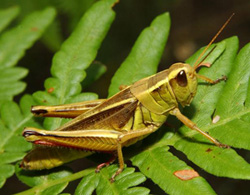|
Will Earth’s Growing Human Population Turn to Insects as a Food Source?
by Andrew Liu, age 16

More people than ever are thinking about ways to cut down on greenhouse gas emissions. Some scientists suggest that cutting back on our meat diets would help. The raising of livestock like pigs and cows occupies two-thirds of the world’s farmland and causes 20 percent of greenhouse gases according to some estimates.
It turns out that the key to saving our planet may not be just cutting back on meat; instead, switching our diet to insects may be the answer. In fact, the United Nations (UN) wants to search for alternatives to the meat in our diet. The UN Food and Agriculture Organization (FAO) are considering a policy paper on the eating of insects. They already held a meeting on the topic in Thailand in 2008, and a world congress meeting is in the plans for 2013.
Professor Arnold Van Huis is an entomologist, a zoologist who specifically focuses on insects, at Wageningen University. He says, ”we know people are consuming more meat. Twenty years ago the average was 20 kilograms, it is now 50 kilograms, and will be 80 kilograms in 20 years. If we continue like this we will need another earth.”
Professor Van Huis also notes that most of the world already eats insects and it is only in western countries that people do not. More than 1,000 types of insects are known to be eaten by choice around the world. Some examples include Japan, where they have dishes including aquatic fly larvae in sugar and candied grasshoppers. In Cambodia, deep fried tarantulas are popular with the local people and tourists, and in Mexico, agave worms, which are large and fleshy caterpillars, are eaten on tortillas and grasshoppers are toasted for a nice snack.
There are several advantages to an insect diet, such as high levels of protein, vitamin, and mineral content. Farming insects produces far fewer greenhouse gases than raising livestock. Insects produce about ten times less methane and 300 times less nitrous oxide and ammonia than livestock.
Van Huis understands that eating insects in the western culture is “a hard sell” because of the ‘yuck ‘factor that goes with insects.”
Paul Cook, whose business, Osgrow, supplies insects for human consumption in the United Kingdom (UK) also believes that insects will never become more than a novelty no matter how they are presented or marketed in the west.
Even if insects never catch on with us as a food source, it is interesting to think about all the different ways humans affect the rest of life on our planet.
[Source: The Observer]
|

